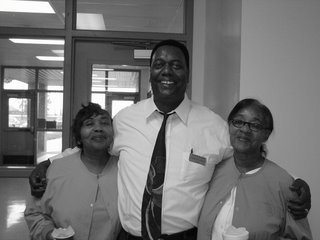Sunday, October 29, 2006
Reflections and Synthesis thus far
Another week down:
Well one week down and I’m getting a little more regular at keeping this thing up. I’m currently typing the first part of this blog after driving 109 miles from Lake Village to a little town (big for me, over 3,000 is a big town) called Sheridan about a half hour south of Little Rock. I’m here to help judge the junior all-region choir contestants. I volunteered to do this gig, and I’m already struck at the differences I’m seeing being only 109 miles away from Lake Village and maybe only 30 miles from the “Delta.” The hallways of this school are brightly painted all around and there are posters around the room with motivating slogans within eye distance.
It’s simply the difference of money and class. Driving from
Now, I’m not saying my school district lacks these things: we have motivated teachers, and nice facilities considering the socio-economic status of our kids. We actually have caring adults in the community who are involved in our school: this isn’t the reality in other communities: in fact, there’s a separation. What I’ve found is this: most of the problems we are currently facing down here stem from integration in the early 70s when the public schools were forced to consolidate and end the evil and constitutionally abhorrent state-sanctioned separation of a population based on race. While there’s no longer a state rubber-stamp for this segregation, there still is profound segregation even in
This of course stands against what I believe fundamentally about the American Education system: first and foremost we have to live up to our ideal of providing a free and equal education to all children in
The results of this exodus are apparent: since very little has been done to improve conditions in poorer neighborhoods and there is widespread ignorance about the causes of poverty in our country. We expect single mothers who had their first children in their teens and work every day just to scrape by to provide the same level of support and dedication to a school system that likely failed them when they were there. As conditions deteriorate in schools, further alienation occurs and the schools become unsafe places: qualified, motivated teachers don’t want to teach there, school administrators are brought in to fix things but end up being corrupted by power and money and not acting in the best interests of the school.
I want to stress again that the
The question of how is a tricky one. Teach for
I would also say the lack of progress is an indictment on the expectations and assumptions we have made about American public education since its inception. The kids I’ve been working with simply face huge obstacles by virtue of their status: ADHD, violence, poverty. Within the system we have, these kids come to school and we expect them to be rigid, good students, quiet when we want them to be and going from their lockers to their classroom. After all, we all did that just fine, and within the system we’ve managed to make it to where we are through our hard work. I think this is part of the problem: the idea that “I did it, and I had it pretty tough, so everyone else should be able to do it” needs to be dispelled. Maybe the actual system is flawed. In
So into this dilemma I’ve been sent, a sort of inspired-teacher band-aid over a much bigger problem. I remember talking with a mother who had a child in our town right after integration: she said the biggest mistake she made was sending him across the river to the affluent private school because with that act she let the local school lose her support and investment, and encouraged the loss from other parents. It’s encouraging to see this level of reflection, but this blog represents the most vocal I have been about my observations so far (ok, not vocal, because I’m not actually speaking). It will take more time, and I’m working my hardest to keep my mouth shut and my ears open: this teaching job is a journey to me, seeing and observing a different reality and a different part of our country that is missing out. I’ll keep you updated as I learn more.
Until next time,
-Nate
“I’ve been so damn tired. Cus’ I spy something wrong”-Guster
Sunday, October 22, 2006
It's been awhile...
Reflections:
Well, it’s been a roller-coaster ride these past few weeks full of fun stories and interesting tidbits, so why not dive right in eh? (PS, sorry for the belated update, it’s been long overdue, so here we go).
First story: I find myself in a bus heading to a choir competition about one hour late with only one student auditioning despite assuming and hoping that three would show up. The sun is rising in the east and the sky is orange as the bus goes by cotton fields and farm houses towards our destination:
I learned a valuable lesson about a few “teacher” things that I hadn’t known about previously or simply didn’t act on earlier. Number 1: always always always triple check transportation plans. I awoke around 5 a.m. that morning hoping to leave at 6 and assuming the bus would be at the school. I arrived at the school that morning to find the front gate (that lets traffic onto campus) locked and closed, but there was a large bus at the nearby gas station. Lo and behold, that was my bus, but much larger than what we needed for the trip. What we needed was a
Well, I had hoped that all three of my students would arrive on time at the high school and assume that the bus was the one parked at the gas station, so they would turn around and come to the bus. That didn’t happen. In fact, by about 6:10 none of my students had shown up and I knew where one of them lived. Lesson number 2: get phone numbers and addresses of your participants. This should’ve been a given and should’ve been something I had moved on earlier. I ended up dragging my single participant out of bed (not literally, but I did wake his folks up and they drug him out of bed) so he could be my sole participant in the SE regional choir contest. He had a decent audition but unfortunately did not make the cut.
Ah well, lesson learned. Next year I’ll be sending way more students and will have the music at least a month in advance and have my transportation plans nailed down. Sometimes we just have to live and learn. I did get some good contacts with other choir directors and got to do some judging, which consisted of sitting behind a black curtain with other directors (most in their 40s and 50s and all females…had great conversations about grandchildren) and listening as nervous altos and basses sang the same sets of music over and over.
Story #2: the class. As far as the classroom, in the past few weeks I have implemented a few new strategies to keep my kids engaged: class points and class jobs. The class points system is more for my choirs: the two periods compete with each other and start out each day with 10 points. They hold onto these points if they’re following procedures and rules (not talking while I’m talking, being respectful to one another, etc). At the end of each period I tally the points. The first class to make it to 200 will receive McDonalds from Mr. Moneybags himself: their choir teacher. Ahh, bribery. It’s pretty effective, but I need to be more punishing with my individual consequences. So far we’ve been able to cover an sight-read three songs in each class (I’m putting the choirs together for the concert so we can have a nice, full sound). This weekend I spent some time looking at our Christmas music, and found two pieces that should be very easy to learn and will be a lot of fun to sing. One of my fellow teachers suggested that I let the kids pick which songs they will sing for the concert, and I think that’s a good idea but we’ll see. I’ve found that one of the difficulties for me teaching choir is that I have many assumptions about how a good choir is run and the mindsets of my students: when I’m in a choir I always differ to the director and always take the pieces that are given to me. I’ll grumble if I don’t like the particular piece, but I’ve always found (with a couple of exceptions) that no matter how much I hate a piece early on I learn to appreciate and eventually love it by the time the concert rolls around. These kids see things that way, and I think it might be a good investment strategy to give them more ownership of their music (“Ok, you’ve decided to sing this, so lets pull it off, etc.) I need to give it more thought, but by tomorrow I’ll have a decision for sure.
Class jobs are coming off to a shaky start, but on the whole are working well. The way it works is that I “pay” my kids in tickets every day. The average kid will earn 5 tickets barring behavioral difficulty (I take away tickets if they’re not following instructions, talking, given dhalls, etc). However, I have since hired (and they actually filled out applications) a few students to carry out classroom jobs (passing out papers, taking roll, lining the kids up outside, etc). The job part has been very successful. My roll takers are faithful and do exactly what they’re supposed to. My line enforcers are honest about how many marbles we earn (marbles are my class reward) and I have a very easy system of tracking how many tickets students have either earned or lost each day. The trouble is that the kids use their “pay” to buy things at the class store, which is currently run by an overwhelmed manager with a faulty cash register (me). My new challenge is to find a way to streamline the store so it only takes, say, 10 minutes for me to “sell” my various bribery items to the kids without having to take too much time in figuring out how many tickets are left over.
I’m still having difficulty with classroom management, and am realizing more and more that I simply put up with too much backtalk. Last week I implemented a pretty harsh consequence for backtalk, and it’s proven effective (they get three dhalls every time they back talk). Musically the munchkins have started to learn how to sing notated music using the skills that they’ve (hopefully) developed the past nine weeks (knowing the line and space notes, amount of beats for a quarter note, etc). We’ll be diving into more music this coming week and will probably be doing some music history as well.
Story Number 3: the weather (because everyone talks about it anyway). Weather-wise it’s been pretty windy and “cold” down here in
That’s all for now, but stay tuned, maybe I’ll be better about keeping this thing up to date as next week rolls around.
Cheers,
-Nate
“They see me mowing, my front lawn. I know that it’s obvious I’m white and nerdy. Think I’m just too white and nerdy.” –Weird Al



